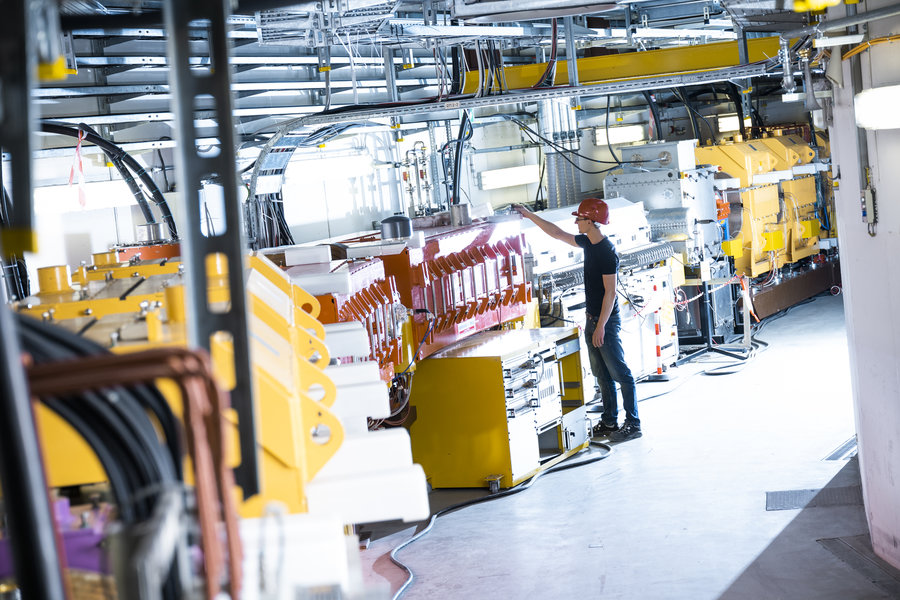Start of the innovation platform HI-ACTS — Accelerator technologies boost innovation in health, materials and energy supply
06.04.2023 |
This news is based on a press release by Deutsches Elektronen-Synchrotron DESY.
Radiation therapy, manufacturing radiopharmaceuticals, developing and certifying drugs and designing energy-efficient semiconductors and new high-performance materials – these are just some of the different areas that are of great economic relevance. They are also areas in which accelerator-based technologies offer enormous advantages to research and development, in manufacturing and for quality control. However, at present the potential of such technologies is not being fully tapped outside the field of science. The Helmholtz Innovation Platform HI-ACTS, with the participation of the GSI Helmholtzzentrum für Schwerionenforschung, is stepping up to change this.
HI-ACTS will be jointly operated by GSI together with project coordinator DESY, Helmholtz-Zentrum Dresden-Rossendorf (HZDR), Helmholtz-Zentrum Berlin (HZB) and Helmholtz-Zentrum Hereon. Accelerator technologies operated by the Helmholtz Association will be made available to industrial users in the form of a cost-effective full-service infrastructure. This means that existing research infrastructures, such as DESY's synchrotron radiation source PETRA III and its successor PETRA IV, will be easier to use when studying industrial questions.
At GSI and the international accelerator center FAIR (Facility for Antiproton and Ion Research), which is currently under construction, a position will be created for this purpose, which will further develop and professionalize relationships with relevant industrial partners. Partners can, for example, use experiment time at the accelerator, as is already established in a collaboration between the European Space Agency ESA and the Biophysics research department for radiation hardness testing of electronic components to be used in space, or in the production of nanostructures in materials research. The computing capacities of GSI/FAIR's particularly energy-efficient high-performance computing center Green IT Cube can also be employed by external partners.
“To network with relevant partners for transfer, GSI has established a proactive innovation ecosystem and sees the HI-ACTS innovation platform as an ideal partner for further expanding and professionalizing the areas of infrastructure use and services around its accelerator facilities,” says Dr. Tobias Engert, head of Technology Transfer at GSI/FAIR.
“Accelerator technology has great innovation potential that needs to be exploited for a wide range of societal challenges,” adds Professor Paolo Giubellino, Scientific Managing Director of GSI and FAIR. “The new HI-ACTS platform will provide a single point of contact for industrial partners, establish administrative procedures and offer the best possible support for researchers.”
In addition to making better use of the existing accelerators in the research centres themselves, HI-ACTS aims to establish the technology of compact accelerators so that these devices can easily be used on site, for example when developing drugs, or as powerful instruments for cancer therapy.
The platform will set up Technology Labs, specifically drawing on the competencies of the scientific partners for relevant technological developments, such as compact accelerators or cyclotron solutions for radionuclide production. From the very beginning, HI-ACTS will be designed in collaboration with industrial companies, ensuring that the needs of companies working in fields such as medical technology, high-performance semiconductors, (radio‑)pharmaceuticals and radiotheranostic materials can be specifically addressed.
HI-ACTS is one of two projects that are currently receiving funding within the framework of the Helmholtz Association’s “Innovation Platforms” funding scheme. The common factor between all the applications is that they specifically address challenges for which the research centres within the Helmholtz Association can develop sustainable solutions relevant to society at large.
Implementation of the platform will start as of now and will run for a period of three years, with a total volume of just under 13 million euros. Current plans envisage HI-ACTS operating beyond this period in the long term. (DESY/CP)













